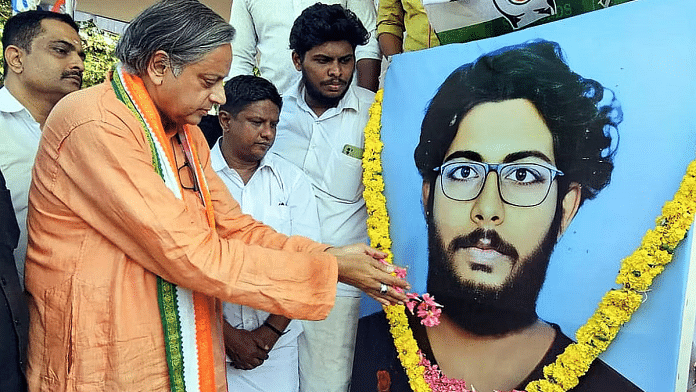The death of JS Sidharthan, a young veterinary student who fell victim to brutal torture and bullying allegedly at the hands of Students’ Federation of India members in Wayanad in February 2024, sent shockwaves through Kerala. The autopsy report reveals a gruesome and criminal ordeal. Sidharthan’s horrifying experience, including a mob trial, assault, and torture, highlights the dark underbelly of campus violence that plagues our educational institutions.
On 9 March, the state government referred the investigation to the Central Bureau of Investigation (CBI) after Chief Minister Pinarayi Vijayan met Sidharthan’s family.
This wasn’t the first case of its kind.
For three days, Sidharthan endured extreme brutality and acts that defy humanity — according to the police and post-mortem report, he was paraded naked and beaten by weapons like rods, canes, or wires. Equally disturbing is the fact that the hostel inmates, witnessing this cruelty, failed to report the violence, and that is why they too are at fault for Sidharthan’s death. It is baffling that the hostel warden, dean, and other staff were oblivious to the prolonged violence taking place within the college premises. This incident is not an isolated one but rather a manifestation of the criminalisation of politics on our campuses, hindering Kerala’s pursuit of creating a knowledge economy.
The tragedy exposes various systemic issues — political monopoly, violence, and intimidation — that cast a shadow over our academic spaces. This toxic culture, fueled by extremist ideologies, social shaming, smear campaigns, and public trials, has eroded the standard and reputation of educational institutions in Kerala. Urgent intervention is imperative to break free from this destructive cycle and ensure responsible student activism.
Multiple such cases point to a collapse of law and order in the state. Unfortunately, the culprits, often affiliated with the ruling Communist Party of India (Marxist), escape justice due to weak chargesheets framed under political influence and pressure. The 2019 incident in which an SFI leader attacked a student at Thiruvananthapuram’s University College for singing without permission underscores the urgent need for a comprehensive investigation into the state of political activities in all educational institutions in the state.
Toxic culture on the rise
The lackadaisical approach of the police force in cases involving student leaders exacerbates the problem. The Crime Branch’s failure to issue a chargesheet against SFI activists in the Public Service Examination (PSC) scandal, despite the accused being involved in the assault case, raises serious questions about the credibility of law enforcement. A thorough investigation into the status of political activities in educational institutions is crucial to prevent a one-party stranglehold that jeopardises the integrity of academic spaces and the future of our youth.
A toxic culture of criminal intimidation, violence, and authoritarianism, particularly by the SFI, has been on the rise in once-peaceful campuses. Since the murder of SFI worker Ashraf in 1974 in Thalassery, campus tranquillity has only diminished, prompting many students to leave the state for higher studies. Parents have grown increasingly anxious about sending their children to local institutions.
The escalating percentage of educational loans in Kerala, surpassing Rs 5,200 crore, according to official statements in Parliament, reflects the diminishing trust in public educational institutions. This loss of trust poses a serious threat to the state’s aspiration to attract private investment and foreign campuses. No investor or reputable institution will risk associating their name with a space tainted by violence, bloodshed, and a lack of security.
The case of Sidharthan is unique in that he was not actively involved in politics, making it clear that the government must address the core issues affecting educational institutions. The proposal to set up private universities and foreign campuses in Kerala should not proceed without a comprehensive strategy to eradicate violence and restore a culture of responsible and democratic student politics.
It is high time to work on political exclusion within campuses. Implementing educational reforms with maturity and insight is essential to create an environment that fosters academic excellence, innovation, and safety. Kerala’s educational institutions must shed the shackles of violence and political hegemony to regain the trust of students, parents, and potential investors. Only through concerted efforts and decisive actions can we ensure that no more lives are lost to the reign of violence or extremist political monopoly in our academic spaces.
Amal Chandra is author, political analyst, and commentator. He tweets @ens_socialis. Views are personal.
(Edited by Humra Laeeq)



